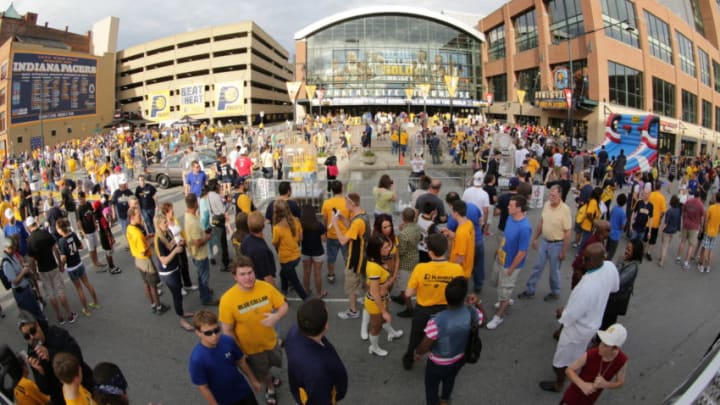The Indiana Pacers are worth $1.4 billion according to the latest franchise valuations from Forbes, making them the 20th most valuable in the NBA.
You have given the Indiana Pacers $46 of your hard earned money on average, according to the latest Forbes NBA franchise valuations and their revenue-per-fan numbers. That’s the part you play in Mr. Herb Simon’s $1.4 billion franchise.
That makes them the 20th most valuable franchise in the NBA.
Forbes published the annual price tags for every NBA franchise, which is a 19 percent jump from last year. It’s hard to believe that Simon bought the team for a mere $11 million in 1983 or that the team would have sold for as low as $230 million in 2010.
In comparison, the New York Knicks are valued at $4 billion, the most in the NBA.
Thanks to the game growing globally, the increased value of TV deals (internationally, nationally, and regionally), the rising tide of money has made everyone who owns a stake in an NBA franchise much wealthier.
All of this is why it is a bit ludicrous that the taxpayers of Indiana are paying $160 million to keep the team in town until at least 2024.
Economics 101 with the Indiana Pacers
I know, I know, this isn’t a fun subject, but let’s just be honest about the situation.
Now, I don’t blame Simon at all for this, or anyone involved with the Pacers organization. It would be great if they chose not to seek public funds, but they also wouldn’t be successful business people if they didn’t leverage things to their advantage.
It’s unfortunately how the industry works. It doesn’t matter that there are no real signs of economic growth from these situations, and cities rarely see a worthwhile return on investment. You can follow any of these links to learn how a mix of tax breaks, public funding, and financial shenanigans ends up making it not worth the cost as far as the dollars are concerned.
Indiana, in comparison, doesn’t appear to have one of the worst deals when it comes to this sort of thing, that could be the Atlanta Braves, but the Pacers still turn a profit, and a handsome one.
It’s worth noting the Simon family says they want to keep the team here and haven’t alluded to trying a veritable hostage situation as some team owners do when they want their business subsidized. But $1.4 billion is still a lot of money for them and it’s hard to say they need tax dollars to make it all work.
More from 8 Points, 9 Seconds
- 2 Studs, 1 dud from gut-wrenching Indiana Pacers loss to Charlotte Hornets
- Handing out early-season grades for Pacers’ Bruce Brown, Obi Toppin
- 3 positives, 2 negatives in Pacers In-Season Tournament win vs. Cavaliers
- 2 positives, 3 negatives from first week of Indiana Pacers basketball
- Should Isaiah Jackson’s days with Indiana Pacers be numbered?
And with all that money, we could really ask why any NBA owner isn’t willing to pay the luxury tax every season.
I don’t live in Indiana, so I’m not telling anyone how they should pressure the politicians there. But if you read up on the subject, as far the economics go, the math tends to work one way.
But as one expert is quoted in Chris Sikich’s story for the Indianapolis Star, for many it isn’t so much about the dollar-for-dollar investment as much as it is the prestige for the city and state. It’s a bit of a luxury. It’s public relations in the form of sport.
"“From a purely business perspective, the Pacers are not worth incentivizing,” said Ball State University economist Michael Hicks. “As an amenity, they may well be. My take is cities need to be awfully tight on their tax incentives on these things.”"
The Pacers don’t have to be an economic driver to be worth it for the fans, the city, and the state, but it’s worth having perspective on the situation when a business asks to socialize the cost of something but privatize the costs.
Alright, I’ll get off my soapbox. I don’t want to see the Pacers go anywhere, but if we’re talking about how much they are worth, it’s worth talking about how much they cost, too.
